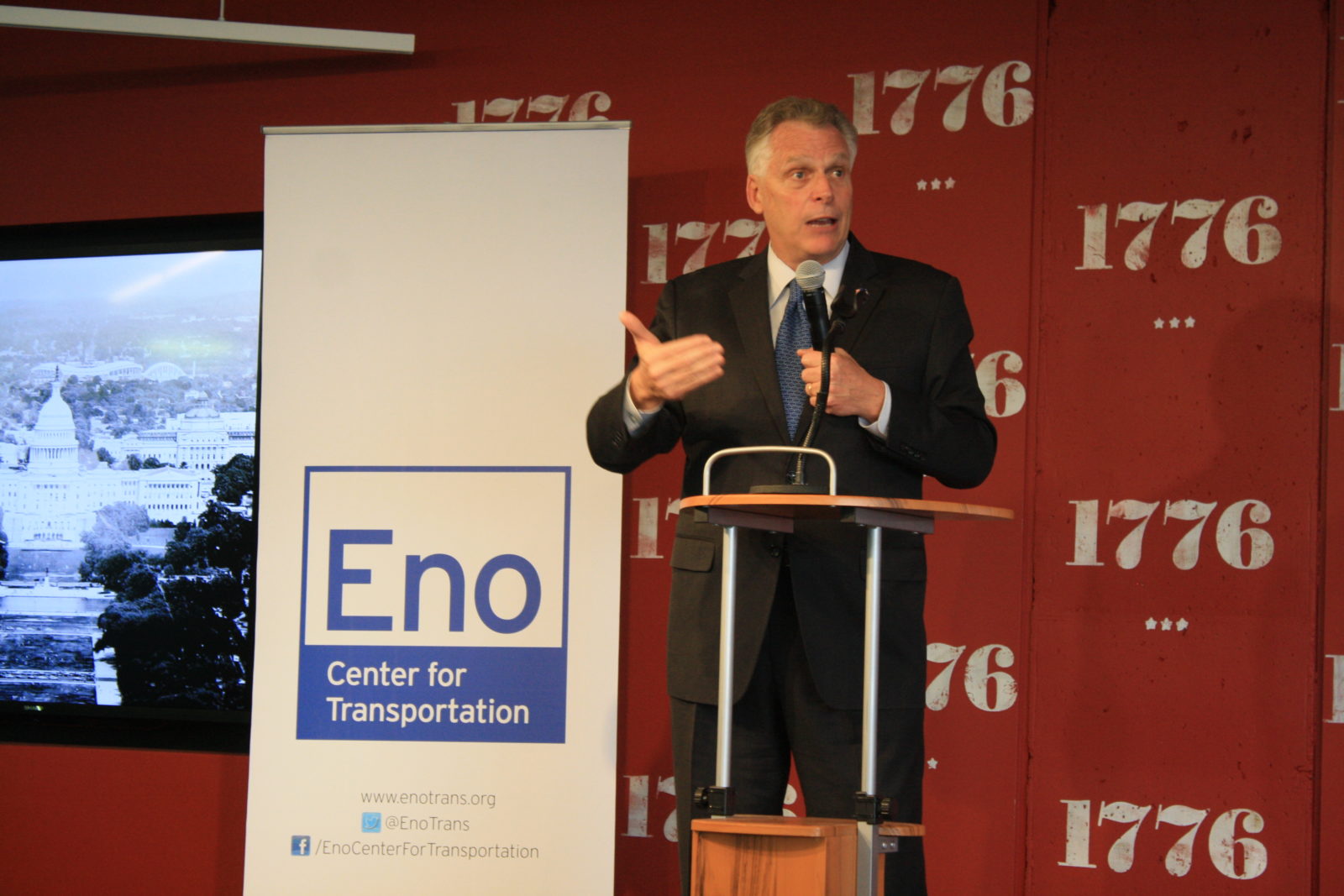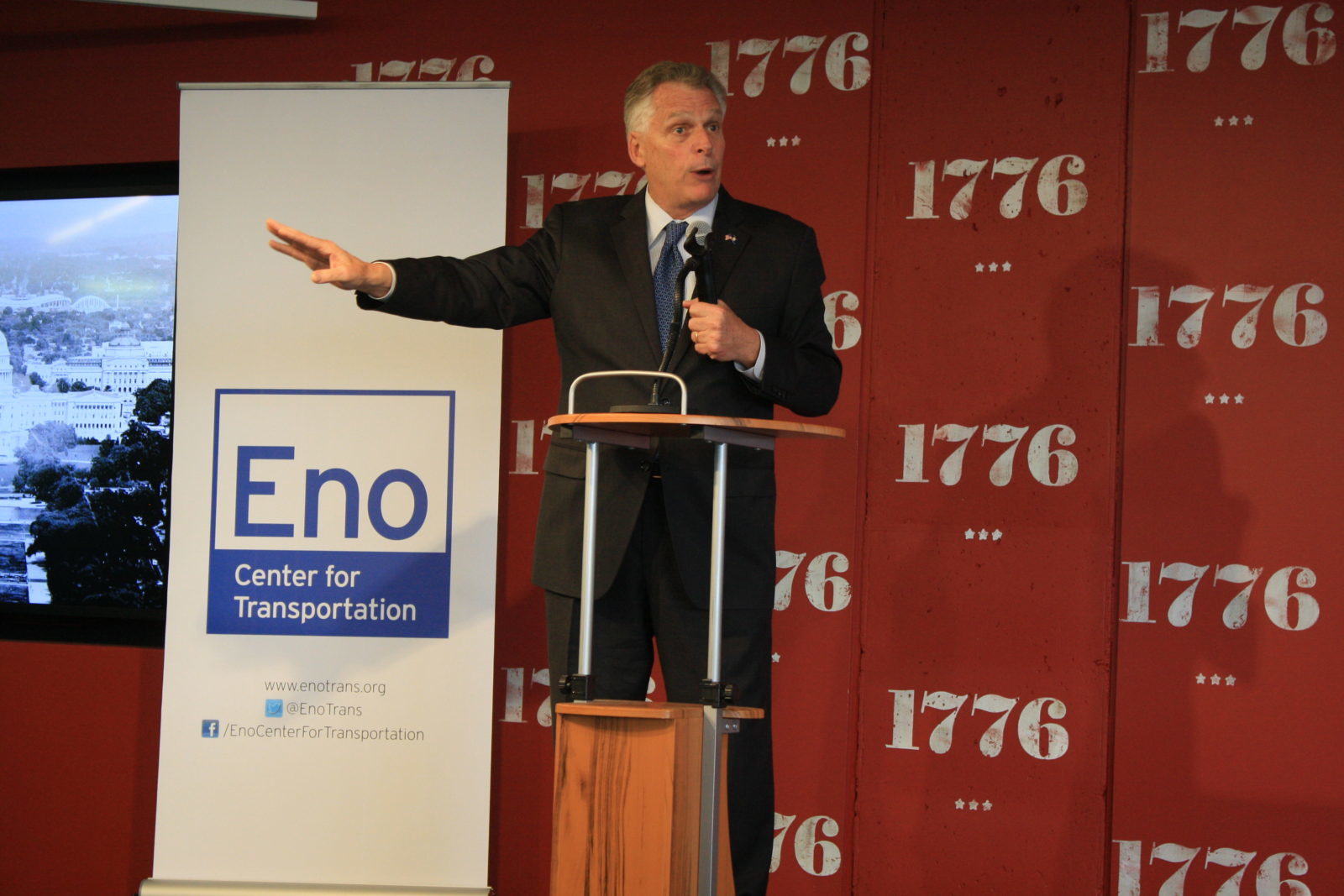April 7, 2017
Throughout his tenure, Governor Terry McAuliffe (D) has been doggedly focused on m aking Virginia a manufacturing and technology powerhouse.
aking Virginia a manufacturing and technology powerhouse.
Now in his final year of office, McAuliffe has turned his attention to the burgeoning automated vehicle (AV) industry, which he hopes will bring a slew of high-tech jobs to the state.
“It is my goal to make Virginia the capital of automated vehicles.” McAuliffe proclaimed at an event hosted by the Eno Center for Transportation for the Virginia Department of Transportation (VDOT).
While research and development efforts for automated vehicles have traditionally been concentrated in the West Coast and Michigan, McAuliffe guaranteed the assembled state officials and industry leaders that he would advance policies to encourage the next wave of AV investments to be directed to his home state.
“We totally unlocked Northern Virginia,” McAuliffe boasted at the workshop, hosted by 1776 in Crystal City. “And we’re going to bury those 49 other states.”
For the event, Eno and VDOT gathered industry leaders and state officials to review a white paper that Eno is preparing for Virginia as it considers how to prepare for the advent of AVs. This white paper, complete with policy recommendations, is scheduled for release next month.
McAuliffe made Virginia into a national cybersecurity leader through a concerted effort that made it the first state in the nation to adopt the National Institute of Standards and Technology (NIST) Cyber Framework to manage cybersecurity risks, register apprenticeships for cybersecurity jobs, and enact digital identity legislation that is now the model for other states.
Bold leadership on cybersecurity issues, McAuliffe said, is why the state is now home to 650 cybersecurity firms and boasts around 17,000 open cybersecurity jobs at any given time.
Now, the governor plans to leverage these same strategies in order to (as he phrases it) “turbocharge” the creation of an AV industry in Virginia with policies that will benefit the industry.
“Virginia has the best opportunity for autonomous vehicles,” he glowed.
But McAuliffe is not alone.
Already, 11 states have passed AV laws, and two other states (Arizona and Massachusetts) have authorized AV pilot projects through executive orders. This is because the federal government has refrained from regulating AVs while they continue to develop, prompting a number of states to adopt policies that authorize and/or explore the testing of AVs within their borders.
Some states, like California and Michigan, have established thorough registration and reporting requirements for companies testing AVs. At the same time, Governor Doug Ducey (R-AZ) attracted companies like Uber, GM, and Waymo to test in his state by issuing an executive order that expressly instructed state and local governments to eliminate regulatory obstacles for AVs.
Meanwhile, McAuliffe and the Commonwealth of Virginia have taken a “soft-touch” approach to the nascent technology. The state has held off on passing AV laws until the technology has developed to a point of sufficient maturity and, at the same time, has focused on researching the potential impacts of AVs on the state.
To this end, McAuliffe’s administration launched a stakeholder working group, dubbed Automated Virginia 20xx, which is reviewing the potential impacts and applications of the new technology on Virginia to (a) understand the needs of the burgeoning industry and (b) assess how the state should regulate AV safety moving forward.
AV tech has been discussed as if it were in its infancy in recent years; the terms “immature” and “nascent” abound in mass media (even though the technology – in its many incarnations – has been around for almost a century). But the technology has rapidly progressed in the past decade in California and Michigan, thanks to significant research and investments by tech firms such as Google and automakers like GM and Ford.
Now, as AVs enter their adolescence, states have the opportunity to influence their growth as they are exposed to new challenges beyond the sunny western states.
“We have 70 miles available already for autonomous vehicles,” said McAuliffe, referring to the states’ Automated Vehicle Corridor that has been designated as a state-sanctioned testing zone.
But, McAuliffe says, designated testing zones are not all that Virginia has to offer:
“We’re the best state… and we’re the funnest… We just reached 182 craft breweries in the state.”


 aking Virginia a manufacturing and technology powerhouse.
aking Virginia a manufacturing and technology powerhouse.


